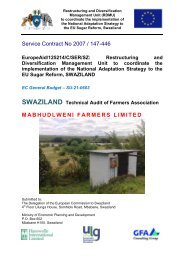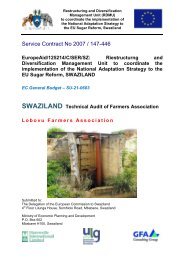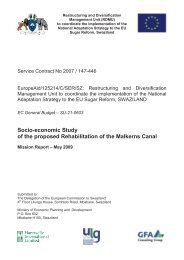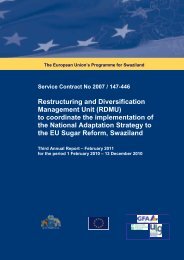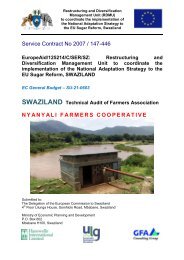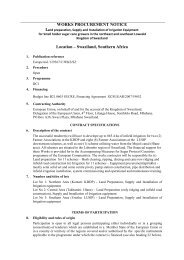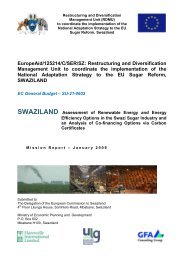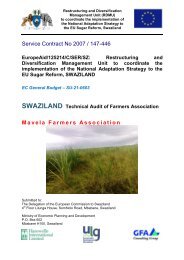Service Contract No 2007 / 147-446 Strategic ... - Swaziland
Service Contract No 2007 / 147-446 Strategic ... - Swaziland
Service Contract No 2007 / 147-446 Strategic ... - Swaziland
- No tags were found...
You also want an ePaper? Increase the reach of your titles
YUMPU automatically turns print PDFs into web optimized ePapers that Google loves.
The second factor influencing water contamination associated to the sugar industry is thepractices for the application of agrochemical products by existing farmers. These are notexpected to change significantly as water contamination from agricultural run-off has notbeen perceived as an issue, either by the industry itself or by the competent authorities.5.7.3 Expected impacts with implementation of theNASExpansion of lands under sugar cane implies a larger use of agrochemical products, andthus an increase in run-off into the aquatic system. As seen above many factor come intoplay in determining the amounts of run-off and associated contamination.Run-off of agrochemicals may increase, in a context of insufficient training on their adequateapplication by farmers, especially by new entrants who have no experience in sugar canefarming. Indeed training to new small cane growers remains insufficient (see Key Aspect 2above) according to the perception gathered by the StrEA team through interviews,increasing the risk of contamination. Nevertheless there are training programmes throughdifferent institutions (e.g. SWADE, SSA, sugar mills) to further address this type of training tocane growers.At the moment it is not possible to determine if water contamination from agricultural run-offand leaching is a real concern, as there is insufficient water quality monitoring data available.The little data that is available however, indicates that water contamination from agriculturalrun-off may indeed be an issue, threatening the achievement of water quality objectives.Furthermore, according to climate change modelling, run-off in <strong>Swaziland</strong>’s river basins isexpected to decrease (see Key Aspect 1 above). This will imply a lower dilution factor by thereceiving rivers, and thus an increase in the concentration of contaminants.5.7.4 Options to address the key aspectActions should be taken to ensure that adequate and systematic monitoring of water qualitytakes place in <strong>Swaziland</strong>. This will be the only way to identify whether run-off of agriculturalproducts from sugar cane fields is an issue that needs to be addressed.The RBAs are now responsible for the monitoring of water quality (under the Water Act,2003), who have an obligation to produce annual reports on water quality (reporting to the<strong>Swaziland</strong> Environment Authority, under the Water Pollution and Control Regulations, 2010),and to alert on situations of non-compliance with the water quality objectives.At the moment any existing data on water quality in possession of the Water ResourcesAuthority (with responsibility for water quality monitoring before competencies were shifted tothe RBAs) has not been transferred to the RBAs. Furthermore the RBAs do not have thecapacities (financial, human resources, technical) necessary to carry out systematicmonitoring of water quality.Appropriate support should be given to ensure RBAs become fully functional, effective andefficient bodies. This will require a needs assessment. Once regular and monitoring of waterquality is taking place, will it be possible to confirm whether agricultural run-off from sugarcane farming is a true concern, and thus trigger necessary remedial actions, which couldaddress issues such as training, design of drainage systems, and possible treatment ofagricultural run-off.RDMU (<strong>Strategic</strong> Environmental Assessment of the National Adaptation Strategy) - Page 96



